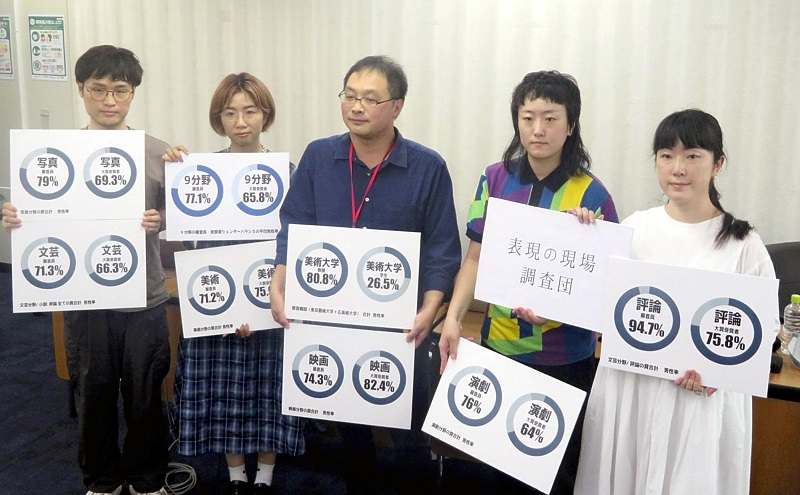
Members of the Hyogen no Genba Chosadan group show their survey results on Aug. 24 in Tokyo.
1:00 JST, September 14, 2022
A survey of gender ratios in artistic and cultural fields has revealed that men hold a disproportionate share of important positions as judges and winners of major awards, and also as teachers and instructors at art educational institutions.
Some administrators of arts awards and others have downplayed the findings, arguing that genuine gender equality cannot be achieved simply by making the numbers of men and women equal.
A 16-member arts research group called Hyogen no Genba Chosadan, which includes artists and film directors, issued a white paper on gender balance for 2022 in late August, announcing the gender representation it had measured in a total of 10 fields: educational institutions, art, theater, film, literature, music, design, architecture, photography and manga.
The group surveyed gender ratios among judges and winners of major awards, directors and professors at art colleges and other educational institutions and other positions over a period from 2011 to 2020.
The survey results show that in the nine fields other than education, men accounted for 77.1% of awards judges and 65.8% of grand prize winners on average. Chiki Ogiue, who helped the group conduct the survey, said: “Men make evaluations and men are valued, while women are dismissed by educational institutions and evaluation institutions. This distorted structure is not imaginary or a result of free competition. Harassment in the guise of ‘teaching’ is widespread in the world of expression.”
Men dominate over 90% of all positions as critical award judges, presidents and directors of educational institutions, orchestras’ full-time conductors and music directors, and Japan Academy Film Prize winners. Notably, there have been no female judges or winners of the Kobayashi Hideo prize, which honors reviews, critical essays and other works, over the past 10 years.
In the field of theater, the proportion of male judges was high for all prominent awards, such as 95.4% for the Kishida Kunio drama prize, 91.5% for the Mainichi art award, and 90% for the Kinokuniya theater award. Men accounted for 73.9% of theater organizations’ executives and art directors, who are likely to have a say in production decisions.
Hyogen no Genba Chosadan member Hikaru Morimoto, who trains actors, said: “I have thought that I do not fit into the world of theater because I lack something as a person or I have no talent. But the latest survey has visualized the fact that the experience of being alienated has happened not only to me but also to a wide range of theater people who are not male.”
Officials in each of these fields have simultaneously expressed both understanding of the purpose of the white paper and some bewilderment.
Yukihito Ito, secretary general of the Shincho Foundation, which runs the Kobayashi Hideo prize, said: “The prize has been run by filling vacancies in the selection committee due to the deaths of committee members. There are not so many people, regardless of their sex, who have enough experience, knowledge and confidence to serve as a selection committee member. We have asked a woman to be a member, but our request was rejected.”
The Shincho Foundation also runs three other prizes that each have a selection committee with a male-to-female ratio of 3:2. These are the Mishima Yukio prize, the Yamamoto Shugoro prize and the Shincho documentary award.
“Publishing companies are desperate to find new talent and they do not take sex into account at all,” Ito said.
Keiko Miyata, a stage director who served as the artistic director for drama at the New National Theatre, Tokyo, from 2010 to 2018, said: “In the selection of drama award winners in which I am involved, judges screen and select nominees fairly and impartially without being informed of their sex, name or age. I was once asked to join a meeting without knowing why — just to make the numbers of men and women equal — and at that time I felt that was rather misogynistic.”
“When it comes to artistic fields like theater, inequalities inherently exist in the sense that some people have talent and others do not. Making everything equal between men and women automatically is not necessarily good, although different generations have different views. I think it would be nice if people with discernment and various backgrounds select award winners while trying to be fair and impartial,” Miyata added.
The white paper is available in Japanese on the group’s website, hyogen-genba.com.
Top Articles in Society
-

Producer Behind Pop Group XG Arrested for Cocaine Possession
-

Man Infected with Measles Reportedly Dined at Restaurant in Tokyo Station
-

Man Infected with Measles May Have Come in Contact with Many People in Tokyo, Went to Store, Restaurant Around When Symptoms Emerged
-

Woman with Measles Visited Hospital in Tokyo Multiple Times Before Being Diagnosed with Disease
-

Australian Woman Dies After Mishap on Ski Lift in Nagano Prefecture
JN ACCESS RANKING
-

Producer Behind Pop Group XG Arrested for Cocaine Possession
-

Japan PM Takaichi’s Cabinet Resigns en Masse
-

Man Infected with Measles Reportedly Dined at Restaurant in Tokyo Station
-

Israeli Ambassador to Japan Speaks about Japan’s Role in the Reconstruction of Gaza
-

Videos Plagiarized, Reposted with False Subtitles Claiming ‘Ryukyu Belongs to China’; Anti-China False Information Also Posted in Japan





















